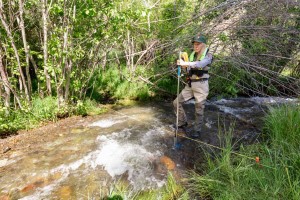Hydrologists and Hydrogeologists

A hydrologist is a geoscientist who studies the distribution of water on Earth,
while the subdiscipline of hydrogeology studies the movement and quality of water on and beneath Earth’s surface. They study how
water interacts with the environment, including its role in shaping
landscapes, climate, and ecosystems. Hydrologists may work in a variety
of settings, from government agencies and research institutions to
consulting firms and non-profit organizations. Their work typically
involves:
-
Collecting data on precipitation, stream flow, groundwater levels,
and other water-related variables. They may also use remote sensing
techniques to gather data from satellite imagery or aerial surveys.
-
Analyzing data to understand how water moves through and is affected
by the environment and how it is affected by human activity. They
may use computer models to simulate water flow and predict future
conditions.
-
Developing water management strategies such as designing water
treatment plants, implementing irrigation systems, or creating flood
control measures. They may also provide advice to policymakers on
issues related to water allocation and conservation.
-
Communicating their findings to other scientists, decision-makers,
and the public through reports, presentations, and publications.
They may also participate in outreach activities to raise awareness
of water-related issues and promote sustainable management
practices.
Read more about this occupation on O*NET OnLine at www.onetonline.org/link/summary/19-2043.00
Explore related careers